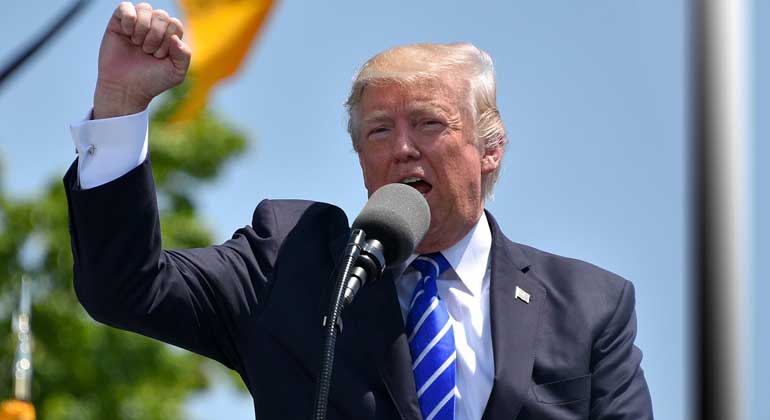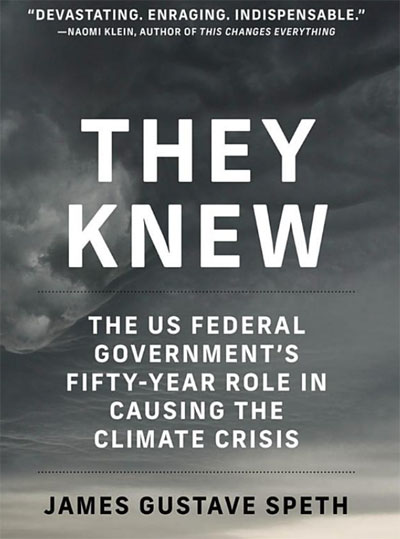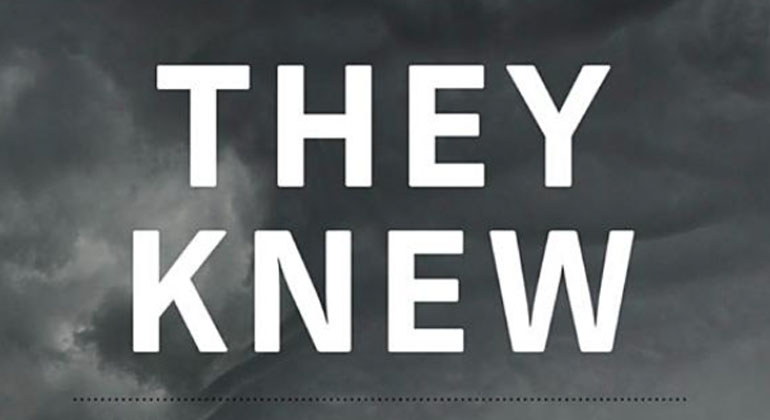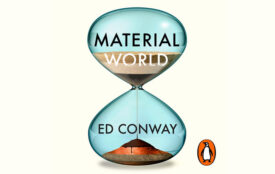A Children’s Climate Crusade
Young people are now at the vanguard of the climate justice struggle worldwide. Prepared on behalf of young people asking for strong climate action, a book by James Gustave (Gus) Speth outlines the US federal government‘s massive failures. A Review by Professor Udo E. Simonis
In 2015, a group of 21 young people (the Plaintiffs) sued the federal government (the Defendants) for violating their constitutional rights by accelerating climate change through the use and exploitation of fossil fuels, thereby depriving them of life, liberty and property without due process and equal protection of law. The group brought legal proceedings in all 50 US states, but these cases did not get very far, until one – Juliana v. United States – landed before Judge Ann Aiken of the US District Court in Oregon.

Judge Aiken issued a ruling allowing the case to go forward. This was just two days after Donald Trump was elected president of the US. When Trump took office, his administration tried mightily, but failed, to get the case thrown out. Meanwhile, the trial reparations went forward. The 21 plaintiffs needed to prove that the federal governments not only knew about the dangers of climate change, but also helped to further increase them by encouraging and promoting the extraction and use of fossil fuels.
To make that case, scientific and political knowledge had to come in. In 2018, the young plaintiffs therefore tapped Professor Gus Speth to compile for them a report on climate knowledge and climate action of the US federal adminstrations from Jimmy Carter (1977-1981), Ronald Reagan (1981-1989), George H.W. Bush (1989-1993), William J. Clinton (1993-2001), George W. Bush (2001-2009), Barack Obama (2009-2017) to Donald J. Trump (2017-2020).
The Speth Expert Report for the case Juliana v. United States was originally submitted on September 28, 2018, and then updated, due to Trumps still lasting presidency on September, 28, 2020.
Specifically, the author was retained pro bono by the plaintiffs to provide expert testimony regarding the historical knowledge of the US federal governments (including the defendants) of climate change, climate science, and alternatitive pathways for the nation‘s energy systems with other than fossil fuels. Included in this agreement, Speth was also asked to testify about the decisions made by the US federal governments to devise and pursue energy policies and, in particular, to maintain the fossil fuel based energy system. Speth then started his academic efforts and delivered a voluminous report covering a period of 50 years, and containing 464 footnotes and 292 exhibits.
In the first part of the book, the author presents important background information that preceded the Carter administration; this so in order to show what the federal government already knew about climate change, and what institutional arrangements already existed – from the National Oceanic and Atmospheric Administration (1955), the National Center for Atmospheric Reserach (1960), the Council on Environmental Quality (1969), to the Environmental Protection Agency (1970), and others. Speth ends this part oft he book with one of the very few positive statements; „When President Carter took office in 1977, there was a growing concern and indeed urgency within the federal government that fossil fuel burning was heating the planet and causing the climate to change in ways that could be catastrophic“ (p.11).
In the second part of the book, the seven federal governments from Carter to Trump are then thoroughly beeing investigated. Speth takes up three matters in the context of each administration: (1) whether the federal government had the basic information about climate science and the link between fossil fuels and climate change, (2) whether the government had abundant recommendations for reducing fossil fuels as spart of the national energy system, (3) whether, notwithstanding those reasonable and available alternatives, the federal government continued to foster the fossil fuel based energy system.
One conclusion of the reviews stands out: The three-part pattern noted continued through all the subsequent administrations. For the year 1976, when President Carter was elected, the United States relied on fossil fuels for 91 percent of primary energy consumption; in 2019, the United States was still overwhelmingly dependent on fossil fuels – 80 percent. Speth believes that during this forty-three-year period, the seeds planted during the Carter administration regarding energy efficieny and renewable energy could have yielded a smooth transition toward an outstanding US climate performance and global leadershíp in climate action. Instead, he states, those years saw only negligible action to reduce fossil emissions and only modest actions to promote alternatives. The result is that CO2 emissions from energy consumption have gone up, not down, climbing by more than 16 percent from 1975 to 2019.
Speth‘s personal conclusion is devastating: „Defendants actions on the national energy system over the past several decades are … the greatest dereliction of civil responsibility in the history of the United States. And it is worse today than ever. This shocking historical conduct, government malfeasance on a grand scale, has left current and future generations enormously vulnerable to substantial danger“ (p. 5).
The reflections in the seven administrative time periods (1977-2020) follow the dual pattern of „government knowledge“ and „government action“. All these chapters are thoroughly based on empiric data, official documents, and individual academic statements. These chapters make great and, at the same time, surprising reading. Only some examples can be recorded here.
In the Carter administration (1977-1981), the federal government’s awareness of climate science and the link between fossil fuel use and dangerous global climate change became well established. The government was fully aware of the need to shift energy policy away from fossil fuels to renewables, efficiency gains, and energy conservation. But despite the growing emergence of climate concern, fossil fuel use and its expansion were consistently promoted in many ways.
During the Reagan administration (1981-1989), the field of climate science continued to mature, but despite the dire warnings of scientists, the federal policies enacted pivoted away from any real pursuit of renewable energy resources or efficiency programs. The commonly observed symbol of that pivot was when the solar collectors were removed from the White House. Speth also reminds us of William Ruckelshaus, then EPA Administrator, and his powerful speech in Paris at the OECD with the warning, that the failure to make a long-term commitment to address climate change would lead to „a succession of unexpected and shattering crises“. And he mentions the pioneering Congressional Testimony by Dr. James Hansen in 1982. Throughout Reagan’s time in office, while his own people were producing significant work on the growing threat of climate change, the same administration firmly committed the country on a path of further extensive coal, oil, and gas development. Meanwhile, as researchers in the federal government continued to sound the alarm, momentum was building internationally for a cooperative response to climate change. The US was drown into the climate issue internationally, with the Brundlandt Commission and the Intergovernmental Panel on Climate Change (IPCC) as major game-changer.
Under the first Bush administration (1989-1993), mixed pictures emerged. On the one hand, alternative policy pathways to reduce climate risk were recognized, on the other hand, policies were enacted that would worsen greenhous gas pollution.
President Bill Clinton (1993-2001) came into office with a clear understandung of the dangers of climate change. Vize President Al Gore had established himself as a national and international leader on the climate issue, his book „Earth in the Balance“ had become a bestseller. In1997, the „Kyoto Protocol“ had been drafted with the ultimate objective to „stabilize greenhouse gas concentrations in the atmosphere at a level that would prevent dangerous anthropogenic interference with the climate system“. When the protocol was being negotiated, coal-state Senator Robert Byrd and his colleague Chuck Hegel introduced Senate Resolution 98 (called the Byrd-Hegel Resolution) that expressed the sense of the Senate that no protocol was acceptable unless it included the developing countries, and would not harm the US economy, As a result, the Clinton adminstration did not submit the Kyoto Protocol to the Senate for ratification, and the United States never joined, thus doing serious damage to the slowly emerging global climate policy.
Despite abundant scientific evidence and warnings, including two more IPCC assessment reports, the second Bush administration (2001-2009) continued to encourage the nation’s reliance on fossil fuels. Still, the president also made pledges to reduce greenhouse gas emissions, relative to economic activity – by using new wording like GHG intensity. But soon after, the president used the Energy Policy Act of 2005 for opening up the Arctic National Wildlife Refuge to oil and gas development.

President Barack Obama (2009-2017) appeared to take the threat of climate change more seriously. By this time, robust climate science and evident climate impacts were just impossible to ignore. He announced a Climate Actiobn Plan, and he participated in international climate summits, culminating in the Paris Agreement in late 2015. But by simultaneously approving more fracking of oil and gas, and building more pipelines than any president bevor him, his administration did not reverse decades of government support for fossil fuel energy. Despite his concerns and piecemeal efforts to take action on climate, the problem only worsened during his administration (p. 116).
Thus far, Speth’s Expert Report fully supports the general position of the young plaintiffs that the defendants continued from the Carter years through the Obama administration to permit, authorize, and subsidize fossil fuel extraction, production, transportation, and utilization that endanger lives, liberty, and property. The history of accumulating scientific knowledge of the dangers of climate change, and the failure to act on them in the US, can and has led to massive penalties against private companies – just think of the asbestos and tobacco industries. But the US federal government itself enjoys „sovereign immunity“, meaning that so far it cannot be sued for damages unless it has consented, and in the case of climate change, it has not. Now we come to the very special case of the Trump administration (2017-2020).

To start with, President Trump and his administration officials have repeatedly mislead the public about the basics of climate change. With 100 notes, Speth led us take part in the many curious and often dangerous statements and activities on climate. For instance, he stated, „I don’t know that it’s manmade“, and disavowed the need to act. The EPA Administrator questioned whether climate change „necessarily is a bad thing“. EPA staff members were given misleading talking points to use with the public. Then Trump even started dismantling EPA; in the first eighteen months in office, the EPA lost on net more than 1,200 employees. There was also self-pollination: the EPA’s strategic plan for the years 2018-2022 did not mention climate change at all. Federal lands were opened up, and regulations were closed down. The administration announced plans to allow new offshore oil and gas drilling in virtually all (98 percent) of US coastal waters; high tariffs wer put on solar panel imports. And then, the decision that shocked the world: the United States officially withdraw from the Paris Climate Agreement. Many other actions were carried through; undermining climate science research, defunding research for renewably energy projects, repealing regulations for reducing emissions of hydrofluorocarbons (HFCs), etc.
Speth ends the chapter on the Trump administration with a cool, objective comment and an emotional, very personal comment. The one: „No administration in modern times has acted with such outward disregard for and disdain of climate science, or proceeded to promote policies that so imperil the well-being of today‘ s children and future generations“. The other: „I have never been as frightened for my grandchildren as I am now, both because of the late hour to try to stop the onslaught of dangers and because of the disturbing disregard of this administration for science and the rights of young people – and all future generations“ (p. 135).
The book contains two more parts: An Introduction and an Appendix by Julia Olson and Philip Gregory, the Director and the Counsel of „Our Children’s Trust“, a nonprofit law firm representing youth in science-based climate litigation around the globe; they both represent the plaintiffs in Juliane v. United States.
In the Introduction, Olson and Gregory explain in detail why Juliana v. United States was filed, and what the importance of the Speth Expert Report is – or could be in future. They admire him as author, and even call him a poet. Especially, they pay tribute to Gus Speth‘ enduring engagement and significant role in protecting the climate and natural systems for present and future generations. They express their hope that the readers of the book will better understand why the climate crisis, as a moral and legal obligation has required them to turn to the courts to hold the federal government accountable for the harms caused by its prior and current actions – both commissions and omissions.
In the Appendix, Olson and Gregory present the procedural history of Juliana. The 21 courageous youth plaintiffs commenced Juliana on August 12, 2015, by filing a Complaint in the District Court of Oregon in Eugene. After that, a true odyssey started. The reader who knows the complex US legal system and procedures would expext that; Juliana has traveled up and down the courts. The reviewer counted the number of controversial meetings: Between August 12, 2015 and March 12, 2020 there were all in all 15 such meetings. On July 18, 2018, the Plaintiffs submitted 18 expert declarations, 21 plaintiff declarations, and hundreds of government documents into the record, totaling more than 36,000 pages. The case Juliana v. United States is not yet settled, and nobody seems to know when it will happen.
The Appendix ends with a question of and a projection by the authors: „Will the new Biden administration come to the settlemet table and support the youths‘ standing in Juliana, or will it follow the path of its predecessors? The youth will soon learn whether the new administration will stand up for their constitutional rights, and stop perpetuating the climate emergency“ (p. 165). The Juliana plaintiffs have communicated that they will appeal the ruling to the US Supreme Court, although they are open to settlementdiscussion with the Biden administration. Now they face a major hurdle: there is a very conservative Supreme Court. So in the end, the young plaintiffs may have the best chance at success outside the courts.

Some final remarks: Gus Speth’s new book is an enlightening and infuriating academic masterpiece, a detailed history of US federal actions and inactions on climate change, a biting indictment and fascinating read. It covers a long period of time, discovers the tricky details of federal support for fossil fuels, and the weakness of support for better energy efficiency and more renewable energies in the United States. The book is richly documented by notes, references. and exhibits – and also a comprehensive index, where I however missed a reverence to the worldwide „Fridays for Future“ activities, and especially the radical star of the young climate activists, Greta Thunberg. One qualitative warning should be added: „They Knew…“ is not a book to be enjoyed; it is serious, very instructive book, not only with regard to the much needed further development of climate knowledge and climate action in the United States of America under the Biden administration, but also in other parts of the world, the European Union and Germany included.
James Gustave Speth “They Knew – The US Federal Government’s Fifty-Year Role in Causing the Climate Crisis” | Cambridge, Massachusetts: The MIT Press 2021, xxviii, 274 pages, ISBN: 978-0-262-54298-2
Source
Dr. Dr. h.c. Udo E. Simonis is Professor Emeritus of Environmental Policy at the Berlin Social Science Center (WZB)








